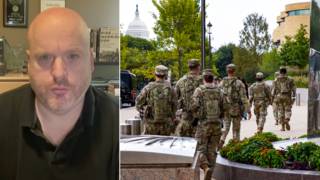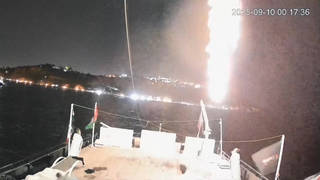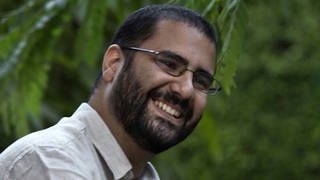
Former Israeli Air Force Captain Yonatan Shapira reports at least two Israeli fighter pilots have reportedly deliberately missed bombing targets in Lebanon because they were concerned they were being ordered to bomb civilians. Yonatan’s brother refused to serve in Lebanon earlier this week, and was sent to jail. [includes rush transcript]
Israel is considering a further expansion of its attack on Lebanon amidst a rising death toll and humanitarian crisis and opponents of the war in Israel have become increasingly vocal.
More than 100 demonstrations have taken place across the country since the fighting began last month. Over 5,000 protesters marched In Tel Aviv last Saturday in one of the largest demonstrations in Israel since the attacks began. Protestors called on Israel to negotiate with Hezbollah and encouraged Israeli soldiers to disobey orders in Lebanon.
Meanwhile, The Observer newspaper recently reported that at least two Israeli fighter pilots have deliberately missed bombing targets in Lebanon because they were concerned they were being ordered to bomb civilians. The Observer also reported that a senior commander who has been involved in air attacks in Lebanon has raised concerns that the air force’s actions might be considered “war crimes.”
Yonatan Shapira joins us on the line from Israel — he is a former Captain in the Israeli Air Force reserves. In 2003, Yonatan initiated the group of Israeli Air Force pilots who refused to fly attack missions that might risk civilian population in the Palestinian territories. He is also the co-founder of the organization Combatants for Peace. Yonatan’s brother refused to serve in Lebanon earlier this week, and was sent to jail.
We also speak with Dan Tamir, an intelligence Officer with the IDF’s Reserves and an activist with Yesh Gvul–an Israeli peace group that supports soldiers who refuse military assignments.
- Yonatan Shapira, a former Captain in the Israeli Air Force reserves. In 2003 Yonatan initiated the group of Israeli Air Force pilots who refused to fly attack missions on Palestinian territories. He is also the co-founder of the organization Combatants for Peace.
- Dan Tamir, activist with Yesh Gvul–an Israeli peace group that supports soldiers who refuse military assignments. He is an intelligence Officer with the Israeli Defense Force Reserves.
Transcript
AMY GOODMAN: Yonatan Shapira is with us, on the line from Israel. He’s a former captain in the Israeli Air Force reserve. In 2003, Yonatan initiated a group of Israeli Air Force pilots who refused to fly attack missions that might risk civilian populations in the Palestinian territories. He’s co-founder of the group Combatants for Peace. Yonatan’s brother refused to serve in Lebanon and earlier this week was sent to jail. We welcome you back to Democracy Now! Yonatan Shapira was in New York in the last few weeks, and we had him on Democracy Now! Welcome, Yonatan.
YONATAN SHAPIRA: Good morning. The line is not so good, but I can hear you.
AMY GOODMAN: What’s happened to your brother?
YONATAN SHAPIRA: I can’t hear you now.
AMY GOODMAN: What has happened to your brother?
YONATAN SHAPIRA: The line is not working.
AMY GOODMAN: Can you tell us about your brother?
YONATAN SHAPIRA: Yeah. If you can hear me, my brother just entered to jail yesterday afternoon, after telling his commander — after asking him why he refused to go to Lebanon, my brother told him that he’s doing so for the security of the citizens of Israel. And my brother is also a member of Combatants for Peace, and by now, we have two members of our organization sitting in jail for refusing to participate in this war in Lebanon. On June 5, the total number of refuseniks that are sitting in jail for refusing to go to Lebanon are five, and we have many who are waiting for trials and waiting for being sent to jail.
AMY GOODMAN: We’re also joined on the phone by Dan Tamir. He is with the Israeli peace group, Yesh Gvul, a group that supports soldiers who refuse military assignments. He’s an intelligence officer with the Israeli Defense Force reserves. We welcome you to Democracy Now! from Jerusalem.
DAN TAMIR: Good morning, New York. Good morning, democracy.
AMY GOODMAN: It is very good to have you with us. You’re an intelligence officer with the Israeli Defense Force reserves. Are you going to serve in this war with Lebanon?
DAN TAMIR: Until now, I have not been called personally to take part in this war, and I hope I won’t be called personally, but there are many other officers and soldiers who were called to this war and, as Yonatan said before, many have said that they are not going to take part in what they see is an unnecessary bloodshed.
AMY GOODMAN: What would it mean if you refused?
DAN TAMIR: Well, I have already twice told my commanders that I’m not willing to carry out such mobilization orders. The first time was in 2001, and the second time in 2004. That time, it was considering going into military regime at the Occupied Territories in Judea and Samaria. Personally, I refused twice, and I was sent twice to jail for one month every time, although it doesn’t have to be like this. Some people just say, “We are not going,” and their commanders just let them go. I must emphasize maybe that going to jail is not some kind of an aim for itself. Some people are sent to jail, but many others are being just dismissed. This is why the actual number of refuseniks, of people who refuse to take actions, is actually much higher than the number of people actually sitting in jail.
AMY GOODMAN: What do you mean?
DAN TAMIR: I mean that there are many people, many soldiers and officers, who say, “We are not going,” and since the Israeli military is the — how should I put it? — doesn’t have the strongest disciplines, many people are just being dismissed by their officers telling them, “Okay, don’t come this year. We’ll call you in a few months,” just in order not to make such a big fuss out of this whole issue.
AMY GOODMAN: Are you willing to go to jail again?
DAN TAMIR: If I would be again given any kind of an order to do things I find illegal, immoral and useless, I would rather go to jail, rather than do such things, which are contradicting the basic interest of the state of Israel.
AMY GOODMAN: Do you have an estimate of the numbers of soldiers or people in the reserves who are saying no?
DAN TAMIR: Well, I can give you a few fixed numbers. Since the beginning of the Second Intifada, that means in the last five years, we had at least 160 people who were refusing and were sent to jail. We know about many others who declared their refusal but were not sent to any kind of incarceration or imprisonment. And we assume there are many, many others who found all kinds of excuses, beginning with physical problems, medical problems and ending with psychological problems or any kind of other excuses, not to go into military service. So, I estimate it in the few thousands, maybe even more.
AMY GOODMAN: Yonatan Shapira, you are a former captain in the Israeli Air Force reserves, your brother now in jail, jailed this week. There’s an article in the New York Times today, a very sweeping article, headlined “Left or Right, Israelis are Pro-War.” Your response.
YONATAN SHAPIRA: Yes, first of all, it’s very sad that indeed the majority of Israelis are now supporting the war. I think there are many reasons for that. Probably people are in some condition of being fear-stricken by the institutions. They don’t get all the information. The media here is very, very biased. They don’t see what you can see in the Amy Goodman show in New York, many thousands of kilometers from the Middle East. They see mostly what the Israeli military propaganda and the Israeli government wants them to see, and it’s very sad, and I think this is part of the reason that we see this kind of support.
But it’s important for me to say that, for example, last Saturday, we were 10,000 people in the center of Tel Aviv, demonstrating together, Jews and Arabs together, shouting that we refuse to be enemies. And we are going to do another demonstration next Saturday in front of the jail, where my brother and his friends are sitting, and I’m inviting all the international media to see what these people and the resistance in Israel to this war is doing. I can tell you some facts and some things that happened also within the Air Force, if you are interested.
AMY GOODMAN: Go ahead.
YONATAN SHAPIRA: Yeah. I just spoke to some friends in the Air Force, an F-15 pilot, and he told me an interesting thing. He told me that since the third day of this war, they are waiting for Bush to stop the war. They also understand that they are playing some kind of role in this whole big war of interests between major forces, not just Israel and not just Hezbollah.
Also he tells me that they are not counting anymore on intelligence. Sometimes they see — you know, they get the coordinates, and they see a house in their target, and they prefer to shoot beside the house, because they don’t know. Maybe there are civilians, maybe there are innocent people sleeping there. Sometimes this intelligence are being based on the fact that Israel told those civilians to evacuate their villages, and then afterwards, they just tell the pilots to bomb some houses then. And I know that more and more pilots are feeling very, very uncomfortable with this situation. And we are waiting for the first pilot to refuse to do these crimes and to help us, Israelis and Arabs in this region, to stop this crazy war.
AMY GOODMAN: Now, Yonatan Shapira, this is very significant, what the Guardian newspaper was talking about and also quoting you about this: at least two Israeli fighter pilots deliberately missing bombing targets in Lebanon, because they were concerned they were being ordered to bomb civilians.
YONATAN SHAPIRA: Yeah, I know that — I guess there are several of them. I spoke with one of them, who told me especially of one case that he just got a target — it was a house on a hill — and he just didn’t want to shoot at the house, and he shot beside the house, and later on, the commanders told him that it’s okay. And my question is, you know, if they can give pilots a target, and later on when the pilot is not shooting the house and telling him that it’s okay, you know, what is all this idea behind those missions, if, you know, you can shoot the house, you can not shoot the house? I think there is a problem, you know, spilling behind all these missions that these pilots are getting.
And just so you know, as pilot, I’m not a fighter pilot. I was a helicopter pilot, and I didn’t shoot anyone, but I know, just like most of the people can understand, a fighter pilot is flying up in the sky, thousands of feet above the ground. He cannot see people. He cannot see — he can maybe see some dots, something on the screen inside the cockpit, but he cannot know whether there are civilians or enemies, or, you know, that the truck is bringing missiles or bringing kids. And if now we see that pilots cannot trust the system, I think it’s a sign that maybe, maybe in the near future, some of them will speak out, not just quietly and continue to serve, but to speak out to the world to help us to stop this war.
AMY GOODMAN: Yonatan Shapira, you come from an Air Force family, from an Air Force neighborhood in a suburb of Tel Aviv. What is the response? I mean, your father served, your brothers, now one of them in jail.
YONATAN SHAPIRA: You know, it’s really, really not easy to be now in Israel against the war. My family, they’re near to Tel Aviv. My parents’ house is full with two families that came from the north, one from Haifa and one from a village next to Nahariya, where they were hit by a Katyusha in their garden. And all these people are, you know, given shelter in the center and now waiting for this war to be end.
And I know that also some of them understand that this war is not going to end if we don’t do something about that. And although the majority, as you just mentioned, is against us, is against the resistance in Israel, in favor of the war, we must do it also for these people, because they don’t have all the information. They don’t have the possibility to see the reality as —
AMY GOODMAN: I want to thank you both for being with us, Dan Tamir, activist with Yesh Gvul; and Yonatan Shapira, one of the co-founders of Combatants for Peace. His brother this week was jailed for refusing to fight in the Lebanon war.












Media Options